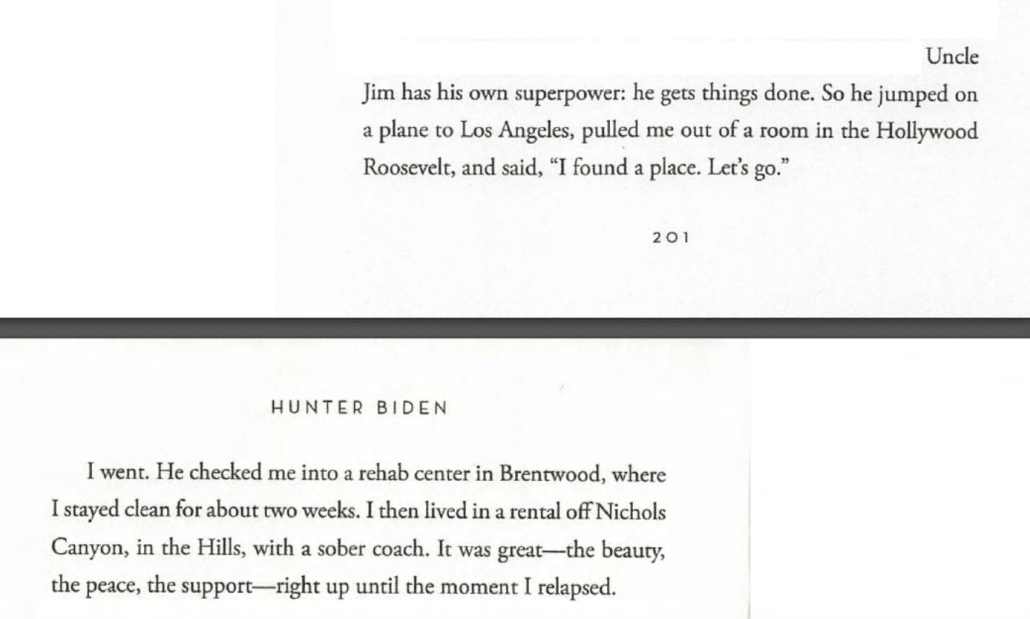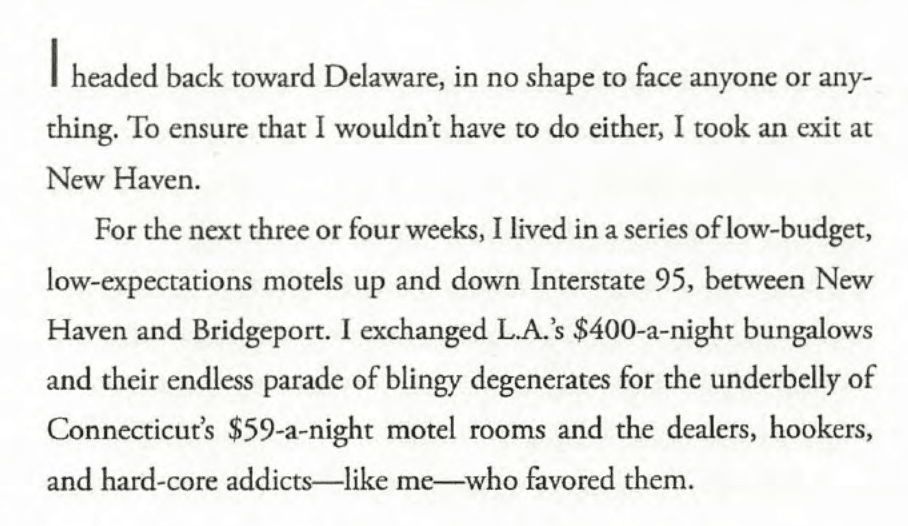David Weiss Continues to Misrepresent the Damage Keith Ablow Did to Hunter Biden’s Addiction
Prosecutors have submitted their motions in limine in the Delaware case. Those include:
- Prohibiting Hunter from arguing that prosecutors have to prove he used drugs on the day of the gun purchase (no position from Hunter noted)
- Admitting misleading portions of Hunter’s book
- Finding electronic evidence (including both the iCloud data and the laptop) self-authenticating
- Prohibiting mention of declination decision in Delaware
- Excluding defects in prosecution
- Excluding evidence about later sobriety
- Excluding claim gun charges unconstitutional
- Excluding discussion of plea negotiations
Most of these are pretty standard and uncontroversial — though Abbe Lowell made it clear that he reserves the right to contest whether Hunter’s iCloud and laptop had been tampered with before the government obtained them.
Where David Weiss has doubled down on past error comes in his choice of book excerpts he wants to use.
He wants to exclude everything from the book except the excerpts he has chosen.
The government intends to admit into evidence only the excerpts of the book and audiobook that are in Exhibit 1. Federal Rule of Evidence 801(d)(2) provides the statement must be “a statement . . . offered against an opposing party.” Thus, a defendant cannot elicit his own self-serving statements without taking the stand and submitting to cross-examination. United States v. Willis, 759 F.2d 1486, 1501 (11th Cir. 1985); United States v. Wilkerson, 84 F.3d 692, 696 (4th Cir. 1996).
A defendant cannot sidestep the prohibition against hearsay by invoking the so-called “rule of completeness,” contained in Federal Rule of Evidence 106. This rule is designed to prevent “misunderstanding or distortion” caused by the introduction of only part of a statement that could only be cured by admission of the full record. Beech Aircraft Corp. v. Rainey, 488 U.S. 153, 172 (1988). It does not allow adverse parties to introduce any unedited statement merely because the proponent party has offered an edited version. Indeed, “it is often perfectly proper to admit segments of prior testimony without including everything, and adverse parties are not entitled to offer additional segments just because they are there and the proponent has not offered them.” United States v. Collicott, 92 F.3d 973, 983 (9th Cir. 1996). The defendant has not identified for the government any portions of the excerpts that are misleading without additional surrounding context. The other portions of the book are therefore inadmissible hearsay.
The selections are not surprising. But in two ways, they are grotesquely dishonest. First, the chosen excerpts misleadingly lead from something that happened in August 2018.
To something that happened in February 2019.
Presented in the way it is, jurors will be wildly misled that Hunter’s New Haven exploits are what happened immediately after he relapsed in August 2018. They will be misled into believing the description of the New Haven depravity represent Hunter’s state in October 2018. They don’t.
Here’s what the language in the book describing his return to Delaware in fall 2018 looks like.
I had returned that fall of 2018, after my most recent relapse in California, with the hope of getting clean through a new therapy and reconciling with Hallie.
Neither happened.
For all the obvious reasons—my extended disappearances, my inability to stay sober, her need to stabilize and reorder her own life and family—Hallie and I called it quits. The relationship no longer helped either of us. Our attempt to reanimate Beau remained as doomed as it was from the start. The fallout piled up. I tried to explain things to my daughters, but how could I expect them to comprehend a situation I hardly understood myself?
Next on my agenda was getting clean. I drove up to Newburyport, Massachusetts, an old New England shipbuilding-turned-tourist town thirty-five miles north of Boston. A therapist ran a wellness center where he practiced a drug addiction therapy known as ketamine infusion. I would make two trips up there, staying for about six weeks on the first visit, returning to Maryland, then heading back for a couple weeks of follow-up in February of the new year.
Prosecutors were perfectly willing to use the transition into this passage in their response to Hunter’s MTD.
He wrote in Chapter 10 of his memoir, “I returned [to the East Coast] that fall of 2018, after my most recent relapse in California, with the hope of getting clean through a new therapy . . . Neither happened.” Id. at 203.
Perhaps now they’ve discovered that the book says nothing about Hunter’s state of mind when he was in Delaware, when he owned the gun.
More importantly, David Weiss repeats what might have been just another stupid error when he made it in response to Hunter’s motion to dismiss:
For example, the defendant admitted that he was experiencing “full blown addiction” to crack cocaine and by the fall of 2018 he had gotten to the point that:
It was me and a crack pipe in a Super 8, not knowing which the fuck way was up. All my energy revolved around smoking drugs and making arrangements to buy drugs—feeding the beast. To facilitate it, I resurrected the same sleep schedule I’d kept in L.A.: never. There was hardly any mistaking me now for a so-called respectable citizen. Crack is a great leveler.
David Weiss misrepresented this passage to Judge Noreika (and has not alerted her to the error). The scene in the Super 8 took place in February 2019.
Which means it took place after Keith Ablow’s treatment made Hunter Biden’s addiction worse.
The therapy’s results were disastrous. I was in no way ready to process the feelings it unloosed or prompted by reliving past physical and emotional traumas. So I backslid. I did exactly what I’d come to Massachusetts to stop doing. I’d stay clean for a week, break away from the center to meet a connection I found in Rhode Island, smoke up, then return. One thing I did remarkably well during that time was fool people about whether or not I was using. Between trips up there, I even bought clean urine from a dealer in New York to pass drug tests.
Of course, that made all that time and effort ineffective. I didn’t necessarily blame the treatment: I doubt much good comes from doing ketamine while you’re on crack. [my emphasis]
Weiss wants to exclude this critical context, imagining that Hunter included the Keith Ablow description because he knew that right wingers would demand he be prosecuted for the gun when he wrote it (Weiss emphasizes that Hunter started writing this in 2019, before he even knew of the investigation), and so said that the Ketamine treatment made his addiction worse for the moment he would be prosecuted.
I get what self-serving hearsay is. This is not it (though Judge Noreika has thus far been wildly favorable to Weiss’ misrepresentations).
This is basic facts of timeline — or more specifically, Weiss’ continued effort to misrepresent events that clearly happened in February 2019 as if they’re his smoking gun about 2018.

